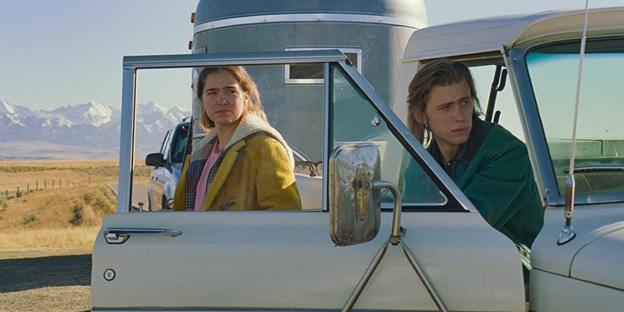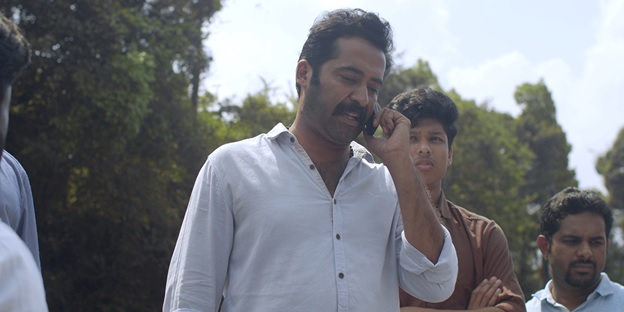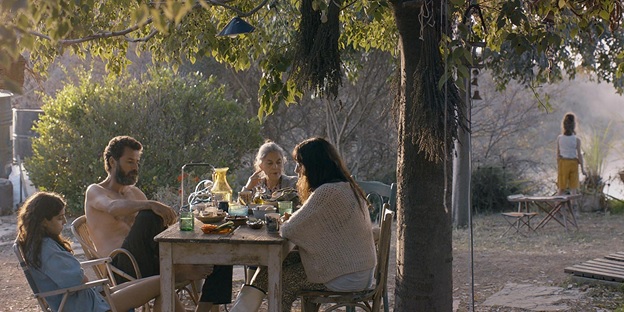Family dramas across generations, continents and genres were a recurring preoccupation at the Toronto International Film Festival this year. A slew of debut features featured familial twists on horror films, but beyond the genre explorations – more straightforward engagements with family, and the implications of generational fate. Three of them, to varying degrees, offered some moving perspectives on what it means to be a part of a family.
 Writer-director partners Scott McGehee and David Siegel’s “Montana Story” had its world premiere in the Platform Category at TIFF. It’s a very straightforward story, a tale of family estrangement interrupted because of an imminent death. It’s a familiar tale, but with a slight swerve. Most family dramas about awkward reunions tend to be punctuated by parent/child dynamics, but in “Montana Story”, it’s the siblings who are at the forefront.
Writer-director partners Scott McGehee and David Siegel’s “Montana Story” had its world premiere in the Platform Category at TIFF. It’s a very straightforward story, a tale of family estrangement interrupted because of an imminent death. It’s a familiar tale, but with a slight swerve. Most family dramas about awkward reunions tend to be punctuated by parent/child dynamics, but in “Montana Story”, it’s the siblings who are at the forefront.
We first meet Cal (Owen Teague), a young man who returns home to deal with his ailing father, and to sell the ranch of his childhood. His father is close to death and the only thing between him and the grave is the migrant nurse caring for him. Cal seems beleaguered and ambivalent about his father, but it’s not until a surprise appearance from his older sister Erin (Haley Lu Richardson) that we come to understand the ghosts of the past that are still living on the ranch.
McGhee and Siegel have had longstanding interest in exploring ambiguous human relationships, and “Montana Story” devotes most of its time to exploring the remnants of a broken relationship. The pair take a road-trip in the middle section, with the backdrop of Montana providing a kind of pastoral backdrop to the emotional scars at work. There are some lovely moments of the plains in the background, that remind us of the smallness of the familial issues against the vastness of the world around them. The waves of melancholy are painted in very specific and very small strokes, the attention is on the specificity of this dynamic rather than any larger point about the state or the world around them.
Luckily for McGhee and Siegel, their actors committed to modulating the tone of the story. Richardson, whose name might be the bigger draw, does strong work in a character the story takes a while to understand. She’s a personable onscreen presence and builds audience trust long before the story is able to contextualise her presence in the story. And she has excellent chemistry with Teague, who is giving the performance of a career. Thus far, at least. The role is written in a straightforward way, young-adult exorcising the demons of his past, and desperate for human contact. It’s to his credit that he meets the script where it is and gives a performance that deepens in the longing glances and earnest looks to those around him. It’s tender and empathetic stuff, and a welcome sign of an actor that has more to give us.
If “Montana Story” wins me over by its gentle approach to family dynamics, the Indian drama “Paka” – a world premiere in the Discovery section at the Festival – grabs you with its brutality. This was one of the first films I saw at the fest, and I’ve kept returning to it and its bloodiness, its moodiness, its messiness and its audacity. Of the many debut features at the festival, Nithin Lukose’s film is one that makes me excited to see a follow-up.
 “Paka”, subtitled “The River of Blood,” is sold as a riff on “Romeo and Juliet” set in Kerala, as a forbidden romance emerges from a decades’ long feud. It’s not an incorrect log-line, but it feels not quite accurate for this particular film. There is a love-story here, yes. Anna and Johnny are from different families that have been feuding for a long time. They are set to be married when the dormant feud is resurrected to tragic results.
“Paka”, subtitled “The River of Blood,” is sold as a riff on “Romeo and Juliet” set in Kerala, as a forbidden romance emerges from a decades’ long feud. It’s not an incorrect log-line, but it feels not quite accurate for this particular film. There is a love-story here, yes. Anna and Johnny are from different families that have been feuding for a long time. They are set to be married when the dormant feud is resurrected to tragic results.
If “Paka” errs in any way, it’s in the way that Vinitha Koshy’s performance as Anna feels peripheral. She and Basil Paulose, as Johnny, do swift work early on to convince us of their devotion, but “Paka” is more preoccupied with the bloody river than with romance, and – luckily for the film, and for us – Lukose does well at excavating hate and violence. The river of blood of the title is filled with dead bodies, and as the film goes on multiple bodies are dropped and retrieved. By the time the first on-screen murder happens, we begin to prepare ourselves for a pattern and with each dive into the river to retrieve a body, things become bleaker and more inevitable.
Arunima Shankar’s editing and Srikanth Kabothu’s cinematography are welcome assets to Lukose. They present forests of Kerala as both friend and foe, the violence never too picturesque but also never lurid. Towards the end, as things begin to hurtle out of control Shankar’s editing keeps the chaos together exacerbating the tension as things build to a crescendo. Such an ambitious entry in world cinema, willing to be messy and chaotic and audacious, is very much welcome. Many films in the discovery programme feel tied to formalist conceits, performing diffident and proper versions of filmmaking. But “Paka” feels defiant so that even its messy entreaties feel welcome for their passion.
 The best of the trio, though, might be the moody and anxious Lebanon drama “Costa Brava, Lebanon” a sly engagement with family dynamics in some clever ways. Mounia Akl directs her script (cowritten with Clara Roquet), places her family drama amidst a climate crisis somewhere in a near-future Lebanon that feels very much like now. As pollution overtakes Beirut, a family makes a getaway to one of the last green spaces – a dreamscape getaway on a mountain, a literal escape from toxicity.
The best of the trio, though, might be the moody and anxious Lebanon drama “Costa Brava, Lebanon” a sly engagement with family dynamics in some clever ways. Mounia Akl directs her script (cowritten with Clara Roquet), places her family drama amidst a climate crisis somewhere in a near-future Lebanon that feels very much like now. As pollution overtakes Beirut, a family makes a getaway to one of the last green spaces – a dreamscape getaway on a mountain, a literal escape from toxicity.
The idyllic is temporary. A landfill is set up next door, and before long garbage arrives and with it the burning of that garbage, threatening their physical space, and creating emotional ruptures in the Badri family – mother, father, two daughters and maternal grandmother. Ostensibly, this is a political drama told through a family story. Akl is clearly concerned with political issues. This is a personal meets political crisis as the family’s life is obviously a political metaphor. It’s understandable, then, that Akl’s deemphasising of the political for the personal might surprise. And, yet, I think this is what makes “Costa Brava, Lebanon” so effective. Yes, this is less engaging as a political drama, but isn’t that a good thing?
Rather than a full-throated political treatise, Akl paints a very specific picture of this very specific family fraying at the edges. Joe Saade’s camera moves slowly though their environments, both as a caress of the environment but also as if hesitant to see where the camera might fall. That dual mix of anxiousness and interest moves through the film. Even before things get truly awry, Akl and her team are conjuring a mood of uncertainty that gives way to tensions. Read as political allegory it might be indistinct, but read as an exploration of family ruptures, this is thoughtful and engaging stuff.
In keeping with her interest in the personal, Akl pulls her actors into focus, treating them with searing empathy. Nadine Labaki is best in show as the matriarch Soraya – committed, but doubtful, to her husband’s way of thinking, wrestling with her commitment to herself, to her daughter and to her ideologies. That Akl resists in clear answers on ideologies, ending on a note of suspended unease, feels natural for this story and its discomforts. It reminds me of the kind of personal glimpse at family crisis that worked well in Hirokazu Kore-eda’s “Shoplifters”. Akl’s film is less formally impressive, but it’s an engaging look at poorness and alternate living that is not pretty or condescending but feels sincere in its explorations. It’s a highlight of the festival.
